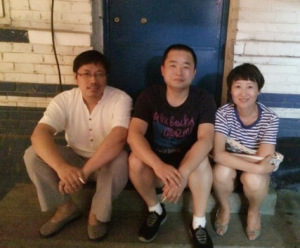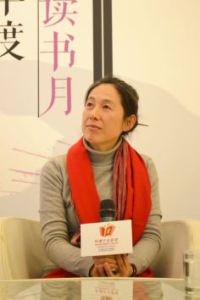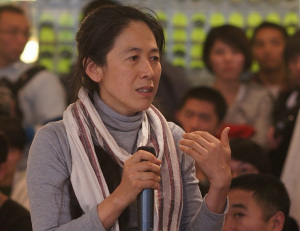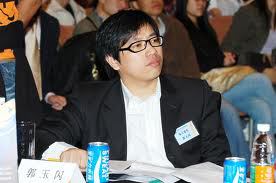By Zeng Jinyan, published: October 30, 2014
“Watching his friends, who happen to be the hope of a better China, going to prison one after another, is more than personal shame. It is the shame of our time.”
Kou Yanding was taken away by police in Beijing on October 10th for “picking quarrels and provoking disturbances.” The day before on October 9th, Guo Yushan was criminally detained on the same charge.
Two days before the arrest, Kou Yanding, otherwise known as Button, was free in Hong Kong, helping me make a breakfast of eggs in noodle soup in my kitchen. To her friends in the NGO circle, Kou Yanding is a bestselling author on such incendiary subjects as trying on parliamentary procedures in Chinese villages and endurance walking. To my daughter, she is Auntie Button. This past year, on her numerous trips to Hong Kong, Yanding slept on my living room couch, or else took the top of my bunk bed. She would take my daughter to the park and clown around with her. When she was with us, I noticed my daughter did not get upset with me nearly as often. She made Shandong-style buns, the skin crisp and the filling juicy, to share with mainland students studying in Hong Kong.Kou writes about hiking as social cohesive. But given how controls on freedom of association still hem in all communal activity in China, even hiking is seen by the authorities as political.
Along with local hikers we had just met, we trekked deep into the mountains of the New Territory, in the middle of the night. Through pouring rain, we glimpsed fireflies swarming over the source of the reservoir and abandoned farmhouses. Most of the time, she left bright and early at six or seven, a bag of water slung over her shoulder. Trudging in toe shoes, she chatted with locals on the mountain paths, interviewing the city’s residents, academics, reporters and activists, trying to understand Hong Kong grassroots and civil society through endurance walks and long hikes. In her books, she set down what she found out for the mainland Chinese audience. When she went home to write ‘in lock-down mode,” shutting everything else out, she felt like “a foaming crab” with the words flowing steadily out of her. She was completely drawn into what she saw.
None of this is meant to portray her as some armchair bricklayer of words who never lifts a finger to act. I cannot, however, write down all the things she has done, for her goodness only counts as so much crime in the eyes and hands of the powers that be, who have made a sport out of pinning “provocation and quarrel” on activists. Suffice it to say that she established support organizations for disabled artists and survivors of the 2008 Sichuan earthquake, and is a vegetarian and environmentalist. She rarely talks about herself, and absents herself from all her books in order to focus everything on the people she writes about. Her writing, however, speaks volumes on her thinking and deeds. (A list of her books is included at the end of this article.)
The last time she helped me with breakfast, she was passing through Hong Kong, only staying one day. I thought Occupy Central, the protest movement for universal suffrage, an excellent opportunity for her writerly observation and, as part of our larger discussion on what was happening in the region, asked why she did not plan to stay longer. Feverish with concern, she could not wait
to get back to Beijing. She cracked jokes about the rapidly diminishing odds of her book, which was on endurance walking in Hong Kong, getting the go-ahead from the censors. Never mind the slew of prizes that came her way. Once Occupy Central started, mainland censors would leave virtually no space for maneuver on anything having to do with Hong Kong. She was casual about the prospect of getting blocked, saying she may as well finish up writing about hiking in Taiwan.
While we were all worried, we thought it unlikely anything would happen to her. For she has been, over many years, low-key, pragmatic and generous in accommodating wrongs inflicted upon her. All she cares about is communicating with her audience in China, looking for ways to motivate each person to take a baby step, to put out a little toward our society’s progress. The public knew nothing about her and Lang Xiaoyan (梁晓燕), a veteran environmentalist, making a risky visit in 2005 to the blind human rights lawyer Chen Guangchen, who was then under house arrest and suffering abuse from his guards. Or about the secret police stalking and investigating her after she came to see me. Or the fact that she was a leading reporter at the independent journal, “Civil Society,” that was eventually shut down by the government. Or to have the opportunity to hear her speak openly about the pressures and political travails she withstood to keep her NGO alive.
She always wears light, comfortable cotton or linen clothes that draw no attention, her dark hair twisted into a knot at the back. She usually wears running or toe shoes. Carefully neat, briskly efficient, she is quiet, open, and easy to get close to. Her backpack always supplied with simple food and a water cup, she is someone who makes demands on herself and takes thoughtful care of her own needs, all the while ready to adapt and to take care of others, anywhere, anytime.
Button usually does not talk about politics as such. She gets down close to each person as they are, with deep empathy for the constraints they live under, giving voice to their stories. She and Guo Yushan, another friend detained on Oct 9, represent a most valuable group in today’s Party-State China. They are clear-sighted, have no interest in reaping applause with criticism, but would rather quietly work at what they believe. Faced with misunderstanding and reproach, they are always able to achieve what they begin, and afterwards retire without bothering with the limelight. You can say they bow to political pressure, or that they do it out of love for their family, but they are always willing to bend their necks. In this way, they survive each wave of political persecution.
In the campaign to rescue Chen Guangchen, an untold number of people held heaven knows how many meetings and worked both openly and under the radar. Out of sheer chance, the challenge fell to Yushan, who ran with it and beat the system at great odds. He worked with others to hide the blind lawyer in various locations, evading the secret police with Mission Impossible ingenuity, and succeeded in getting Chen to the Americans. That he executed such a spectacularly daring conclusion to one of the largest human rights campaigns ever seen in Communist China, and still managed to avoid prison until now, says everything about him.
In 2009, my husband Hu Jia, an environmental activist and Buddhist, was in prison. The company where I used to work was sold. I started a child care service in my neighborhood, and the government shut it down. A job at a floral delivery company evaporated when the police told my boss to let me go. My baby daughter had to be fed, and my life hit an all-time low. I craved an opportunity to work in the physical world rather than the virtual online space, with a steady income, the chance to come in contact with other people, where I can realize my self-worth. This was easier said than done. A friend extended an invitation to translate articles for a magazine under a pen name. However, my name got stuck in the mandatory political vetting at the human resources department. I also balked at the thought of interacting with the editors under an identity not my own and the nagging worry over the political risk my employment posed for the management, who did not know about my trouble with the police. Eventually I called it off. When Yushan found out, he invited me to go work at his think tank, Transition Institute, and he is the only friend who was able to directly help me realize my dream to have a job.
I used to flatter myself that I am someone with my feet on the ground, but my idealism was, after all, often too heavy for the world to handle. Not only did Yushan not blame me, he was able to catch the thorny ideas I tossed his way, nursing each one until it became reality. It does not cost much to criticize the Chinese government. To serve the target population, to patiently attend to each thorny task, in order to change the state’s economic and social behavior – how many civil society players and organizations can keep to this in the long haul?
Transition Institute took measured and solid steps. This made its raid and closure inevitable. When dealing with the Chinese government, you can’t simply take the high ground of political correctness and wash your hands of the whole thing, dismissing all action not absolutely radical as immoral and futile. Nor can you afford to focus on technicalities and reaching objectives, for ignoring the unjust processes of the system will land you in a moral quagmire. The constraints and consequences of following either of these paths may not always be apparent to the eager netizens who yell and wrangle on the Internet over the paths to democracy and freedom. Yushan may have reached a better balance. He never took the easy technical way out or fell back on ideological righteousness. Motivated by a rich spirit of humanism, he took on concrete problems with flexibility, paving the way in incremental steps for the transition of Chinese society.
The moment I found out, all at once, that Yushan was criminally detained, and Yanding taken by the police, I was watching, in one of the liveliest camps of Occupy Hong Kong protest, the members of a local artist community enclave putting down their performance art installations on the streets of Mong Kok. I regretted not insisting on Button staying. She would have fallen in love with Mong Kok. Nathan Road, a main thoroughfare usually crowded to the bursting point, has turned into a playground for strolling residents and citizen politics. Under the rubric of the fight for universal election, grassroots citizens whose background is so diverse as sometimes even to give pause, began with apathy, doubt and sideline spectator sport, and have now taken to the streets of Mong Kok, strolling, selling freshly squeezed juice and digital must-haves for taking protest selfies, putting up soapbox corners for debate and protest signs, culminating in jumping into the fray to protect the students against the police and the anti-protest demonstrators.

LEFT TO RIGHT: GUO YUSHAN (郭玉闪), MURONG XUECUN (慕容雪村), AND ZHOU-LAO-YAN-ER (周老燕儿). PHOTO FROM @YANYUN8964
As the protest draws out, the daily political struggle of a Hong Kong under the rule of an autocratic Chinese government and large corporations slowly emerged on Nathan Road. Residents in the neighborhood halted, for the moment being, their tense and mechanical schedule, wresting back the space and lives cut off by the flow of cars on Nathan Road. Walking to take back the road once more, they think over the issues behind the struggle that are closest to them. How can they make sure that their grounded lives on these vibrant streets are not drowned by highrises and high-speed cars? How to make sure that bakeries, florists, locksmiths, plumber and tailor shops survive the onslaught of jewelry and luxury boutiques catering to mainland tourists? How can Hong Kong provide education, employment and professional prospects with dignity to its youth, rather than forcing them to interview as early as kindergarten, with opportunities expanding at the bottom rungs while shrinking for the most highly educated?
The takeover of Nathan Road by grassroots participation, for all its vibrancy and richness, still affords many with the option to distance themselves from politics, something often symptomatic of post-totalitarian societies. If the mainland had been willing to protect Hong Kong’s basic freedom of speech and rule of law, even if democracy was still a distant vision, the people of Hong Kong would have simply put up with the status quo, and would not have joined the protests. Those who know what to do, like Guo Yushan and Kou Yanding, would have patiently acted through their ideas, backed up with thoughtful action aiming for gradual success.
Whenever an old friend was arrested and sentenced, Yushan would have his outbursts in anger and pain, his wife Pan and the rest of us – a few female friends – would glare at him in unison: “Fatso, you had better not get yourself in there!” The prison of the despot ravages the frail flesh in order to tempt the best to betray their friends, and it’s not to be taken lightly. Yushan knows this as well as anybody. He swallows this the best he can, and is often hijacked by the sting of humiliation, while he gives help to the family of political prisoners, in silence and doing what is possible. Watching his friends, who happen to be the hope of a better China, going to prison one after another, is more than personal shame. It is the shame of our time.
Now, leaving his parents, wife and child behind, he is also gone inside. Button is gone too. The last we heard, after a week of disappearance, she is in a detention center in Beijing, accused of the crime of “provocation and causing disturbances.” I am worried that the machinery of the state would brand their flesh with torture, and at the same time I have faith that they would be able to hold on to who they are in the interrogations, getting across to their individual opponents with their humanity.
In the city of Sodom, the virtues of the good are no other than their innate sin.
List of Kou Yanding’s works:
Poems by My Side, Essays at My Side, 2002, Yuanfang Publishing.
Dreaming of Beauty, the first nonfiction work about disabled artists, 2005, Beijing Publishing.
Everything Starts with Changing Myself, nonfiction on civil society organizations, 2007, Hainan Publishing.
Tell the World How Beautiful It Is, the first series of disable artists’ work, 2011, first volume.
Hands-on Democracy, Introduction of Robert’s Rules in China at the grassroots level, 2012, Zhejiang University Publishing.
Actions Changing the Way We Live – Civil Society Forces, 2013, Zhejiang University Publishing.
Guo Yushan’s bio: Guo Yushan was born in 1977 in Putian, Fujian Province. He has a master’s degree from Beijing University in Political Economy, and is one of the founders of Open Constitution Initiative, one of the most prominent and few public interest law groups giving aid to victims of official injustice. Founder and executive director of Transition Institute, whose major areas of research include livelihood issues, economic analysis of taxation and regulatory issues in public policy, anti-monopoly reforms, effect of monopoly on taxi driver income, and the environmental and economic impact of the Three Gorges dam construction, the largest hydraulic dam project to date. Yu Shicun, a writer, describes him as “a passionate scholar who has run salons for freedom of speech, philanthropy, academic work, translation, environmental protection, and defense of civil rights.”
ZENG JINYAN (曾金燕)
Zeng Jinyan (曾金燕) is an activist, blogger and scholar. She is currently doing her Ph.D. on state-society online/offline relationship, feminist practice, cyber activism and documentary activism in China. Among her recent publications is “The Politics of Emotion in Grassroots Feminist Protests: A Case Study of Xiaoming Ai’s Nude Breasts Photography Protest Online,“ The Georgetown Journal of International Affairs, 15(1), 2014. Together with Hu Jia she documented their life when he was in house arrest in the film Prisoners in Freedom City (2007).
Related:
Civil Disobedience in Sodom – A Letter to Xu Zhiyong, by Guo Yushan
(Translated by Louisa Chiang)



